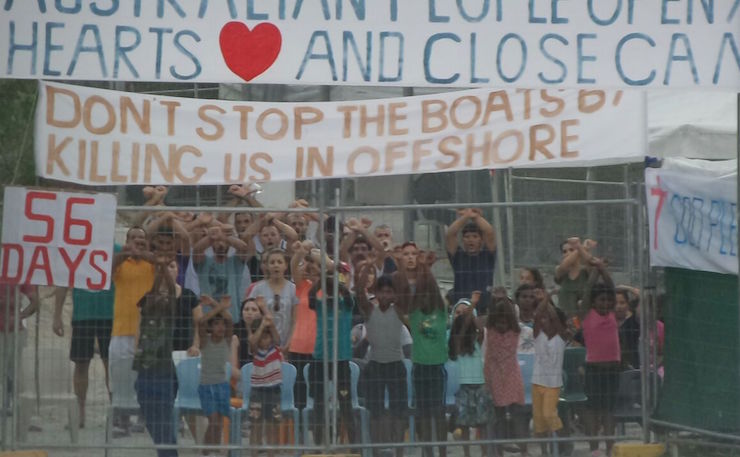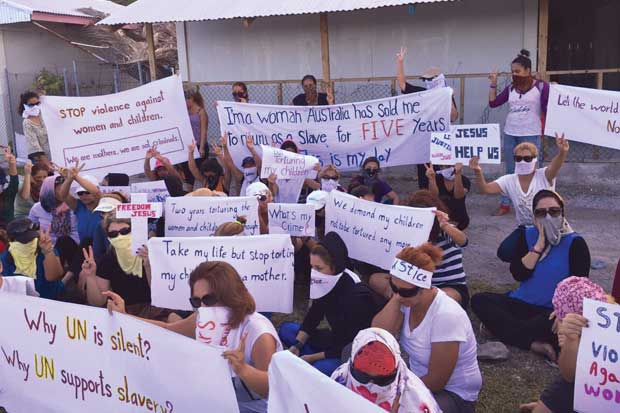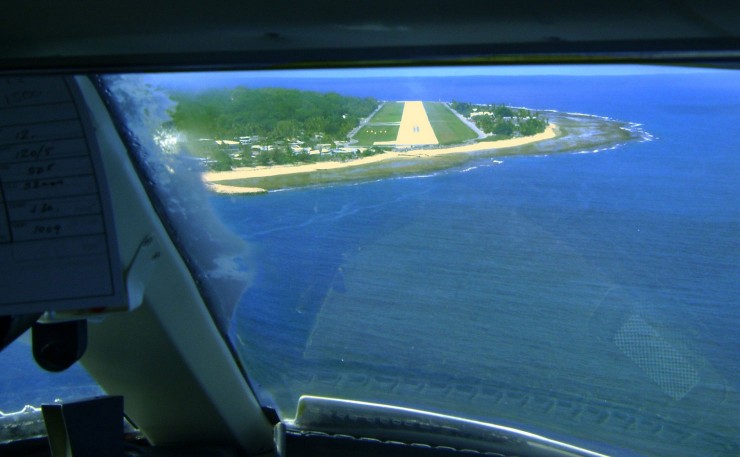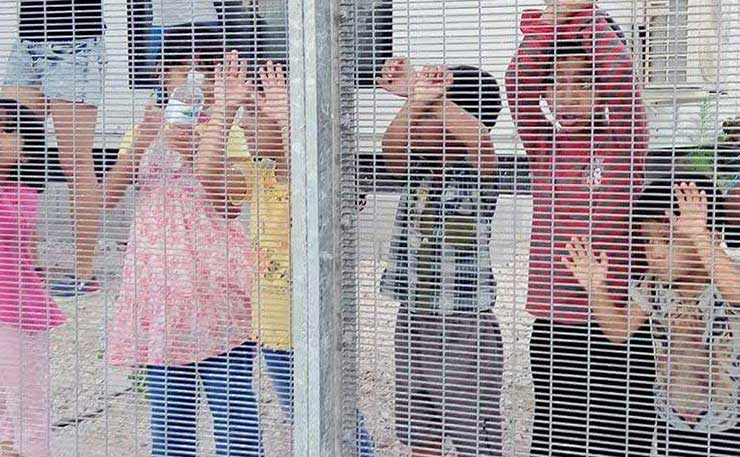Michael Brull reviews a report by Amnesty International released today, which chronicles the deliberate cruelty and torture being inflicted on innocent men, women and children on Nauru. And a warning – much of the detail in this report is extremely disturbing.
On Monday, Amnesty International released a new report on Australia’s treatment of asylum seekers on Nauru. Called Island of Despair, it offers an extremely hard-hitting critique of Australian asylum seeker policy.
The report accuses the Australian government of actions that amount to torture, of adopting a deliberate policy of “intolerable cruelty”, and of “the destruction of the physical and mental integrity of hundreds of children, men and women”.
It warns that Australian government rationalisations for these policies “lead down a very dark path”.
The report is based on an Amnesty researcher spending five days in Nauru, and conducting interviews with 58 refugees and asylum seekers. Amnesty researchers pored over the 2,000 documents of the “Nauru files”, obtained by the Guardian, and also interviewed other refugees, asylum seekers, and current and former service workers who have served on Nauru.
Their findings were in line with basically all previous investigations of Nauru. Mental illness and self-harm are “shockingly commonplace.” They found that, “Nearly all of the people whom Amnesty International’s researcher met on Nauru in July 2016 reported mental health issues of some kind: high levels of anxiety, trouble sleeping, and mood swings were frequently mentioned.”

One child “developed symptoms of distress and poor health. Her father told Amnesty International how she vomited, wet her bed every night, and would wake up screaming”.
Amnesty notes that detention itself is a significant factor in the trauma of asylum seekers and refugees on Nauru. They are “trapped on Nauru and face debilitating uncertainty about their future”.
Amnesty notes that, “Although asylum-seekers and refugees on Nauru are not technically detained, because they are able to move around the island, they are nonetheless in a detention-like environment. Nauru is to all intents and purposes an open-air prison that people cannot leave, even when they have been officially recognized as refugees”. Nauru is “not a safe place for them”.
Many of the refugees interviewed by Amnesty “described how they or their friends and family had been attacked and/or subjected to verbal abuse inside and outside of the Refugee Processing Centre. This includes physical attacks on men, children and women – including sexual assaults – as well as robbery and attempts to break into their homes.” Police didn’t properly investigate their complaints.
Health care is “inadequate”. Amnesty notes that, “Certain medical services, specialists, tests and procedures are not available on the island. Individuals said they had to wait for months to see a visiting specialist or undergo a necessary test, even when, according to the doctors, their condition was serious, such as suspected cancer”.
Furthermore, “Descriptions of medical transfers to and from Nauru expose a system that traumatizes the patient”.
There also seems to be a shocking disregard for the health of those patients. For example, “a man who suffered a heart attack after a year on the island was eventually sent to Australia, where he stayed for four months. When he arrived back on Nauru, a doctor saw his file and said, ‘I cannot be responsible for you, they should not have sent you back’. He had another heart attack and doctors have said he needs more specialist treatment that is not available on Nauru.”
Others report that their “returns to Nauru came without warning or explanation, and were sometimes carried out in a deeply humiliating and traumatizing way”.
The report notes that refugees and asylum seekers “have also been subjected to countless daily humiliations that have cumulatively served to dehumanize them and violate their dignity.”
For example, many of them are only referred to by staff by their boat identification number, or their refugee identification numbers. Service providers interviewed by Amnesty “described a range of practices that appear to serve no purpose other than to break people’s spirits, such as expelling asylum-seekers from the showers after two minutes, or forcing people to wait weeks or months to get basic necessities like underwear or shoes”.
Amnesty particularly stressed the abuse of children. The “extent” to which “child refugees are subjected to abuse on Nauru is chilling. Children who are refugees or are seeking asylum have been assaulted both by staff of companies hired by the Australian Government and by private individuals on Nauru. Parents’ inability to protect their children is one of the many factors that exacerbates the suffering of refugees and asylum-seekers.”
In one instance, a guard threw a rock into the face of a child. The child has developed what “seems like autism, barely speaks and has nightmares and panic attacks”. The mother is also struggling to cope.

The report stresses that it is the Australian government that “is responsible for the systematic human rights abuses documented in this report”. After all, “It is the Government of Australia that set up the offshore processing system and the Government of Australia that has forcibly transferred people seeking asylum to Nauru. A range of Australian Government officials and contractors – on Nauru and in Australia – are involved with running the Refugee Processing Centre itself and with the management of the refugee population living outside of the centre. The Australian authorities are continuously informed about what is happening on Nauru.”
When it comes to these abuses, “Nauru is not the state in control”.
The report notes that the “abuses on Nauru have been facilitated by a deliberate policy of secrecy, again established by the Government of Australia”. They slam the law which “gives the government the power to prosecute and imprison doctors, nurses and child welfare professionals who speak out about conditions in immigration detention. This has had a chilling effect on disclosures about human rights abuses”.
According to Amnesty, “many service-providers and asylum-seekers were too scared to speak with” their researchers. Those interviewed singled out Broadspectrum (which runs the “Refugee Processing Centre”) and the Australian Border Force as helping create an “oppressive culture of secrecy on the island”.
This includes staff from Nauru who have reportedly been fired for being considered “outspoken”, and numerous threats to staff that they can be fired “for communicating in any way” about how asylum seekers and refugees are being treated.
The climax of the executive summary is a savage attack on asylum seeker policy. It notes that the “devastating effects” of our treatment of asylum seekers on Nauru “were foreseeable. Even if they had not been, these negative impacts have been evident to the Government of Australia for years. The inescapable conclusion is that the abuse and anguish that constitutes the daily reality of refugees and asylum-seekers on Nauru is the express intention of the Government of Australia”.
Amnesty comments that “In furtherance of a policy to deter people arriving in Australia by boat, the Government of Australia has made a calculation in which intolerable cruelty and the destruction of the physical and mental integrity of hundreds of children, men and women, have been chosen as a tool of government policy”.
Amnesty concludes that, “The conditions on Nauru – refugees’ severe mental anguish, the intentional nature of the system, and the fact that the goal of offshore processing is to intimidate or coerce people to achieve a specific outcome – amounts to torture”.

The “shocking extent of the abuse on Nauru” is “demolishing Australia’s international reputation”. It flatly rejects Australian claims that changing these policies will “create a ‘pull factor’, putting the lives of people seeking asylum at risk, specifically from drowning if they attempt dangerous boat journeys”. Amnesty argues that, “No state can justify subjecting some people to cruelty and abuse to prevent loss of life, never mind to reduce migration numbers. Ends do not justify means and such arguments lead down a very dark path”.
Indeed, they do. And they have. Australia has embraced intolerable cruelty, and the destruction of the physical and mental integrity of innocent human beings. Australia practices torture.
The report concludes by calling for other policy options to considered in dealing with refugees and asylum seekers in the region.
However, “the people whom Australia has warehoused on Nauru cannot wait another day for a resolution to this acute crisis. Amnesty International is calling on the Government of Australia to immediately close down the Nauru processing operation and to bring all asylum-seekers and refugees on Nauru to Australia”.
It calls on Nauru to end the agreement to host the centre, and to take urgent action to protect asylum seekers and refugees there, pending their transfer.
Perhaps this report won’t change much. It will be part of the legacy of Malcolm Turnbull, and the ALP, which reinstituted offshore detention in 2012, and announced that refugees would never be allowed into Australia in 2013.
This report adds further documentation of the horrors on Nauru, for which we all share responsibility.
Donate To New Matilda
New Matilda is a small, independent media outlet. We survive through reader contributions, and never losing a lawsuit. If you got something from this article, giving something back helps us to continue speaking truth to power. Every little bit counts.





